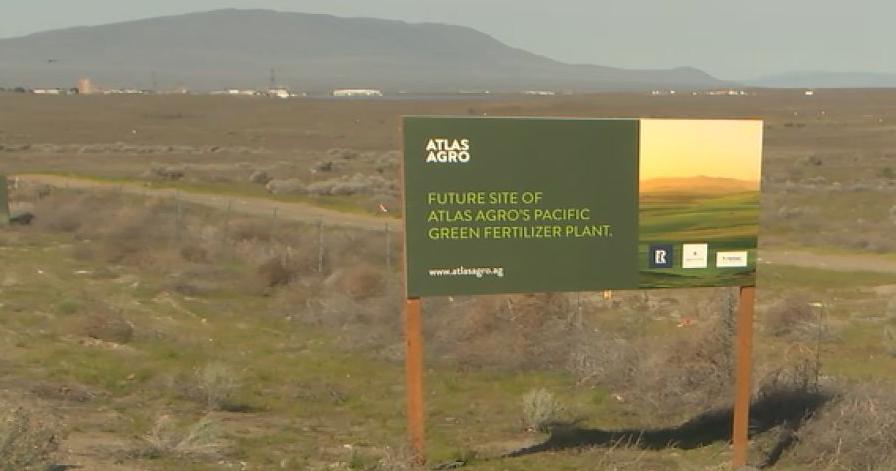RICHLAND, Wash. -- A wooden sign just off Stevens Road in Richland holds the promise of big things to come:
Future site of Atlas Agro's Pacific Green Fertilizer Plant.
What is a green fertilizer plant?
Gina Zejdlik, the head of government relations for Atlas Agro, tells me it's something that's never been seen before.
"Right now, fertilizer plants are built close to fossil fuels; they use that as the feedstock; so that in the process of making the fertilizer there are carbon emissions," Zejdlik says. "They're also using fossil fuels as energy."
Atlas Agro says because of the heavy reliance on fossil fuels, fertilizer production has historically been based in places with cheap fuel, like Russia and China. That means fertilizer has to be imported to the Pacific Northwest, which is expensive and adds another layer of carbon emissions to the process. The company is hoping that building their plant closer to the farms that will use the product will drastically reduce the environmental impact of creating fertilizer - in more ways than one.
"By using feedstock that doesn't use fossil fuels, we can offer the same product; the same fertilizer, here, produced locally, without any carbon footprint," Zejdlik says.
It's exactly the type of project the City of Richland was looking for to build up the Northwest Advanced Clean Energy Park. The land is mostly empty right now, but Economic Development Manager Mandy Wallner says the city is hoping to bring companies focused on creating a 'clean' environment.
One thing that is helping in that effort is recent changes to state law, opening up more opportunities for Targeted Urban Areas, or TUAs. The TUA offers a tax break to companies to develop industrial projects, within certain guidelines.
Wallner says that tax impact is sometimes misunderstood.
"Currently, this is public property," Wallner explains, "so it doesn't have taxes being generated on the land itself."
When a private company buys the property, it has to start paying property taxes, which gives the city budget a boost. But in a TUA, the company has the opportunity to qualify for a tax break on whatever they build in the first three to five years of ownership. Wallner says that offer helps Richland attract big investment projects, like the Atlas Agro plant.
"We're competing with other states; other jurisdictions; in order to do these recruitments," Wallner says. "So this really helps us come to the table as a top competitor in order to attract those."
You can read more about the tax incentives here.
The Atlas Agro plant is expected to employ dozens of people at the plant itself, with a much larger ripple effect on the wider community. Right now, Zejdlik says the company is nearing the end of the engineering and design process, with plans to be operational in 2027.
COPYRIGHT 2024 BY APPLE VALLEY NEWS NOW. ALL RIGHTS RESERVED. THIS MATERIAL MAY NOT BE PUBLISHED, BROADCAST, REWRITTEN OR REDISTRIBUTED.

